
For the 24th year, the African-American Collective Theater marked DC Black Pride Weekend with readings of seven short plays, collectively titled 24/7, all written and directed by Alan Sharpe, whose storytelling mastery and insights into the lives of same-gender-loving black men prompted the audience at Anacostia Arts Center to laughter, cheers, and a few tears.
The titles of Sharpe’s plays often wink with innuendo—e.g., Hand Jobs and Aural Sex. To be sure, Sharpe’s characters and story lines are unblushing and unabashed, but there’s more to his short plays than sex. Sharpe consistently taps into a depth of emotion within and between his characters that comes to a climax with a complexity and narrative momentum one associates with major full-length stage works. Plus he’s got a gift for shade and funny one-liners that had the audience cracking up.
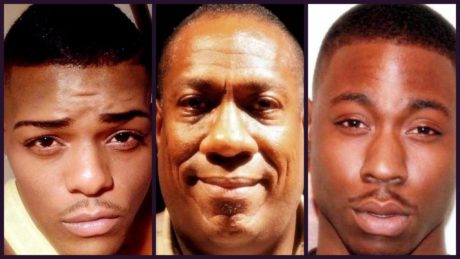
The program began with Raw Deal, set in a seedy motel room where a porn shoot is to take place. Jackie (Donald Burch III), the impatient amateur pornographer, needs a young hustler named Red (Juan Raheem) to persuade Cory, his buddy in the trade, to “go all the way” on camera for big bucks. Jackie leaves the room, Cory (Tristan Phillip Hewitt) enters from the shower, and the bargaining begins. An upgrade from mutual masturbation at $50 a head could mean upward of a thousand if Cory would agree to “smash” Red “raw” (without a condom). There’s comedy in their dickering, but the high stakes make for serious suspense.
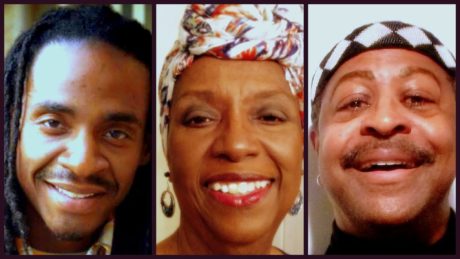
The most emotionally wrenching work on the program was Every Goodbye Ain’t Gone. A son named Louis (Monte J. Wolfe) returns home at the behest of his mother, Earline (Caroline G Pleasant), because his father, Levi (Michael Sainte-Andress), is dying. Louis knows it won’t go well. Twenty years ago, as a 16 year old, he was kicked out of the house by his father for being gay. The son knows the father has not changed, and the meeting is as hurtful as Louis expected. But what Earline unexpectedly tells him afterward—”You tried. Remember that”—became one of those moments one cannot watch without choking up.

A visitation room outside a courtroom is the scene of the gripping No Homo. A high school youth (Maurice T. Olden) has been on trial for beating to death a fellow student. His defense was that the other boy came on to him sexually. The student’s mother (Josette Marina Murray) has come to find out what really happened. What she and we learn is a story full of disturbing truths about a boy’s fear of been seen as gay and how far he will go to prove he’s not.
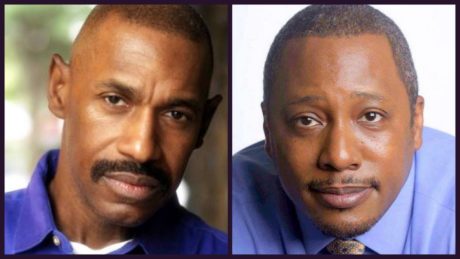
The over-the-top title of XXX-ADULTS ONLY- HOT!!! refers to the backrooms in porn shops that back in the day—before cruising apps—were frequented by gay men for hookups. Sharpe has the two middle-age characters, Rob (Charles Harris, Jr.) and Nate (Larry Hull), regale us with a trip down this salacious memory lane that the audience found hilarious. What brings Rob and Nate together now is the fact that they’re both married and on the down low, and their options for finding a quickie in the dark have dried up—so maybe together they could have an arrangement of convenience? The loneliness in their longing is touching.
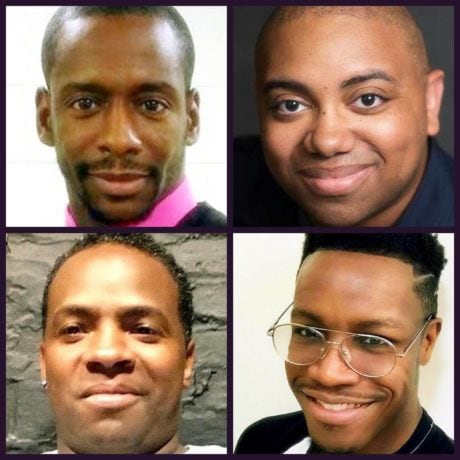
A 20th high school class reunion in a hotel brings four men together in Four-Play. Kyle (Raquis Da’Juan Petree) has brought his sometime boyfriend Drew (Jared Shamberger) but joins another gay classmate, Theo (Ricardo Lumpkin), in the men’s room, and an old flame is rekindled. Meanwhile Kyle is hit on by Damon (Reginald Richard). In the ensuing opportunities for unfaithfulness and deceit, a comic convention, Sharpe finds fresh humor and heart.

The most cunningly misleading title of the program belongs to Sex/Toys, which is actually about two gay fathers who argue about whether Jaden, their adopted four-year-old, should be given “boy toys” or “girl toys.” Anthony (Darnell Morris), who is the more masculine-appearing husband, insists that if Jaden wants princess playthings, that’s what Jaden should get. Kenny (Zukeh Freeman), who grew up bullied for being effeminate, insists on sparing Jaden that fate by making sure he plays with toys that are butch. It’s an intriguingly framed dispute, and a provocative example of how Sharpe can take an “issue” and make it live and breathe.
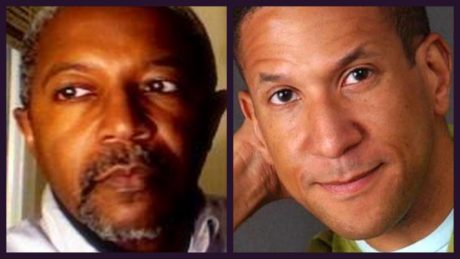
The final entry, a beautiful play called Sunset, is one I had heard and appreciated as part of Hand Jobs. Two long-time lovers, well past middle age, sit on their front porch watching the sun go down. Daniel (Morgan Duncan) is in failing health but does not want to go to his doctor’s appointment; Vernon (Gregory Ford) tries to change his mind; Daniel won’t go. Instead Daniel asks Vernon to sing to him. And the song Vernon chooses is “Bye Bye Blackbird.” As they join in singing it together, the play becomes a gorgeous elegy to love in old age.
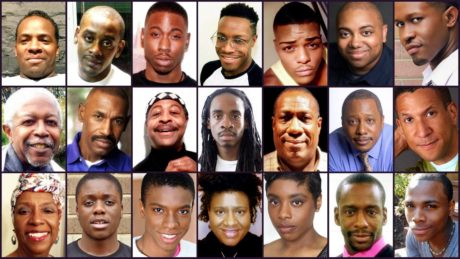
24/7 proved once again why Alan Sharpe has become the local-hero griot of DC’s African-American LGBTQ community.
Running Time: Two hours and 20 minutes, with one intermission.
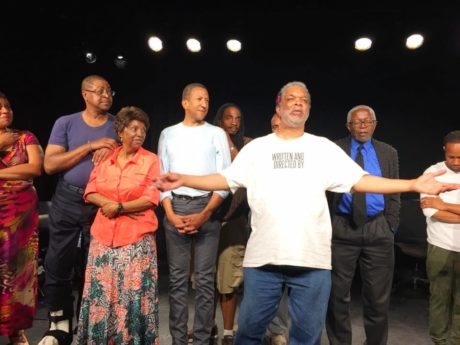
24/7 was performed March 26, 2016, at at the Anacostia Arts Center – 231 Good Hope Road SE, in Washington, DC.
(I attended the 5 pm performance. At the 8 p.m. performance, a play called Prom Night P*ssy—read by Davon Harris, Ashley Nicole Lyles, Emmanuel Kyei-Baffour—replaced No Homo.)




